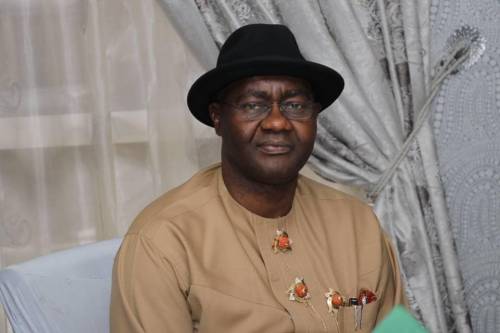The political landscape in Rivers State is rife with tension and maneuvering, as former Senator Magnus Abe has openly accused supporters of Governor Siminalayi Fubara of harboring ulterior motives. Abe alleges that these political actors are not driven by genuine concern for the state’s well-being but rather by a calculated strategy to undermine the influence of the Minister of the Federal Capital Territory, Nyesom Wike. This assertion paints a picture of political opportunism and personal ambition overshadowing the interests of the Rivers State populace. Abe’s statements suggest that Fubara is being used as a pawn in a larger political game, with his supporters leveraging their association with him to achieve their own objectives, which primarily revolve around diminishing Wike’s power and stature.
Abe’s accusations highlight the complex interplay of political allegiances and rivalries within Rivers State. He contends that the support for Fubara is purely transactional, devoid of genuine loyalty or commitment to the governor’s own agenda or the welfare of the state. Instead, Fubara’s governorship is perceived by these actors as a means to an end, a tool to be exploited in their pursuit of weakening Wike. This dynamic raises questions about the stability of Fubara’s support base and the potential vulnerability of his administration to political machinations. It also underscores the deep-seated animosity between Wike and his detractors, a conflict that transcends party lines and threatens to consume the political discourse in Rivers State.
Adding fuel to the fire, Abe invoked the issue of anti-party activities during the recent elections. He publicly acknowledged his own involvement in such actions, admitting to supporting Tinubu, the presidential candidate of a different party, while hindering the campaign of his own party’s candidate. He further implicated both Wike and Fubara in similar anti-party behavior, arguing that they too openly supported Tinubu against their own party’s presidential nominee. This revelation serves to underscore the prevalence of political cross-alignments and opportunistic maneuvering within the state. It portrays a political environment where individual ambitions and strategic calculations often override party loyalty, leading to a complex web of shifting alliances and hidden agendas.
Abe’s argument hinges on the premise that the widespread nature of anti-party activities during the elections undermines the accusations leveled against Wike. He suggests that while many politicians engaged in similar behavior, Wike is being singled out and criticized solely because his preferred candidate emerged victorious. This, according to Abe, reveals the hypocrisy and self-serving motives of those targeting Wike. He posits that their criticism stems not from principled objections to anti-party conduct but rather from resentment towards Wike’s political success. This interpretation paints a picture of a political arena characterized by envy and opportunism, where success is met with hostility and failure conveniently overlooked.
The core of Abe’s message is a cautionary one directed at Governor Fubara. He warns the governor that the support he currently enjoys is conditional and ephemeral, driven by self-interest rather than genuine allegiance. He predicts that once Fubara ceases to be a useful tool in their campaign against Wike, his supporters will abandon him without hesitation. This warning serves as a stark reminder of the precarious nature of political alliances built on expediency rather than shared principles. Abe urges Fubara to recognize the true motivations of those surrounding him and to seek counsel and support from genuine patriots who prioritize the well-being of Rivers State above personal gain or political maneuvering.
Ultimately, Abe’s pronouncements call for unity and collaboration within the state’s political sphere. He implores politicians to transcend their personal ambitions and prioritize the collective good of Rivers State. He specifically advises Fubara to forge alliances with true patriots who are committed to the state’s progress and development, cautioning him against the dangers of isolating himself and relying solely on those whose loyalty is questionable. This appeal for unity underscores the importance of cooperation and consensus-building in addressing the challenges facing Rivers State. It suggests that only through a concerted effort, free from the distractions of personal rivalries and political maneuvering, can the state achieve its full potential. The lack of response from the Rivers State Commissioner for Information further adds to the intrigue and uncertainty surrounding the political climate in Rivers State, leaving the public to speculate about the potential ramifications of these accusations.


